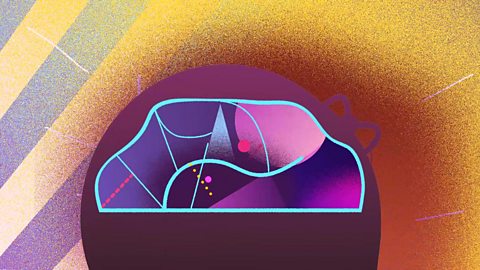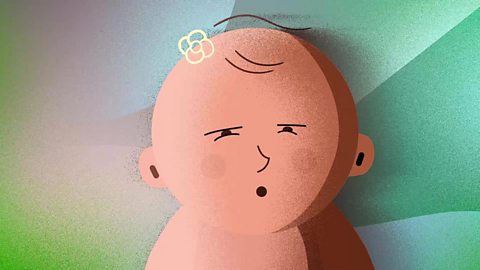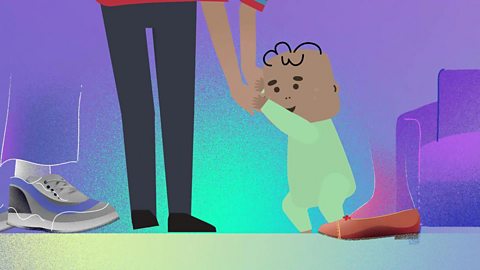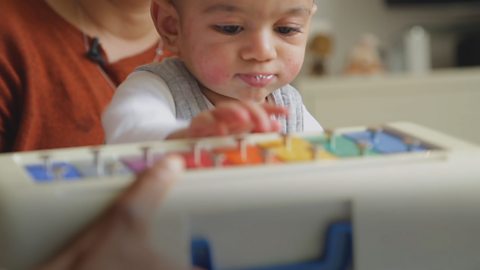Did you know that a baby’s brain starts making connections for speech and language while they’re still in the womb?
It might not seem like it, but their brains are rapidly developing and using lots of energy. Even before they're born, they are picking up on the rhythms of language.
Dr Danielle Matthews, a developmental psychology specialist from The University of Sheffield, talked to us about baby brain development, language recognition and what we can do to help babies learn.
It might not look like it but newborn babies are constantly using loads of energy. On what? Brain development! In the first few months, more new connections are made between neurons or nerve cells, then in any other time in our lives and the brain gets to full size faster than any other part of the body!
As adults, about a quarter of all the energy our body uses is spent on keeping our brains running, for babies though, it's double that! No wonder they get so tired.
Lots of the basics of language development happen in those first months too. Babies can hear the sounds of all languages but the more they hear a particular language, the more they tune into those sorts of sounds and become really good at recognising them.
That's why talking to your baby is so important, the more you chat, the more you're helping them to get their heads round how our language works. You could say you're helping to get their brain in shape!
When does a baby’s brain start to develop?
A baby’s brain starts developing in the womb and by the time the baby is born, they have most of the brain cells, or neurons, they need. As your baby grows, so do the connections between these neurons and this is what makes their brain grow. By the time they are a teenager, their brain will be about four times bigger than it was at birth. It will be wired up much more efficiently and have a special lining on their neural pathways, called myelin, which means that electrical messages can be sent about 100 times faster.
Learning is all about fine tuning connections across the brain. The main way this tuning happens is through experience.
“What is special about humans is that our brains take quite a long time to develop compared to other animals. This means they can be shaped by our experience of the environment, including interactions with other people, which is a big advantage,” says Danielle.
In the first few days of their life, your baby will be tuning into their social environment. They will enjoy looking at faces, making eye contact and hearing your voice. So don’t be embarrassed about using baby talk - they love it! All of this stimulation is great for building brain connections. From the moment your baby begins to develop and grow, so does their brain.
From early years right through adulthood, our brains never stop developing. The brain will stop growing in physical size but it continues forming connections throughout our lives.

Image caption, Though it might not look like it, newborn babies are using loads of energy - lots of it on brain development!
1 of 5
How to help a baby's brain development during pregnancy
The most important thing you can do to help your baby’s brain development while pregnant is to look after your health.A baby’s healthy development can be affected by lots of different factors, so it’s important that you think about:
- Getting plenty of sleep and rest
- Avoiding alcohol and other toxins
- Limiting stress and anxiety
- Not smoking
- Exercising gently
- Eating healthily (assuming you don’t feel too sick)
When you’re pregnant, your baby is already gaining sensory inputs and learning from them. They will hear what you are doing, and although the sounds might not be clear. Your baby will get feedback from your movements and sounds too!
According to Danielle, “During the third trimester of pregnancy, babies can hear their mum talking as she goes about her everyday activities and will naturally begin to pick up on the rhythms of language.” Talking to your bump can be a lovely family experience if you already have children, or a way for partners to form very early bonds with your baby. Listening to your favourite songs together or telling stories to your little one and the bump can be a great bonding activity.
How can you boost babies’ brain development?
In the early days of a baby’s life, their brain will be very stimulated and everything they see and do is a learning experience for themAs Danielle says, “Young babies are naturally learning and there is a lot for them to take in. Just by being together and interacting with your little one, you will start to tune into each other and build familiar routines”.
You can start these interactions with your baby through:
- Skin-to-skin contact, holding them and having cuddles
- Being available and responding to them
- Talking to them face to face throughout your day
- Including them in conversations with those around you
Danielle says it’s important to remember that you don’t need to do anything extraordinary to boost your baby’s development. As they grow up, talking, cuddles and play can be built into your daily routine and can have long lasting positive effects on your child.
How to stimulate a baby’s brain
You don’t need to do too much to stimulate your baby’s brain but giving them cuddles and face-to-face contact is a great place to start.
Sometimes babies can become overstimulated if they are faced with music, lights and too much noise. Remember, they are learning a lot of new things from the moment they are born just by being in the world.
Your little one will begin to learn that your voice goes with your face and your smell. Early on in your child’s life, your baby’s vision is very limited but as they get older, they will be able to focus and tune into what you're doing. We have a collection of simple activities and things to do with children aged 0-3 months. Find some new ways to bond with your baby here.
The most important thing is to enjoy being together. Make sure that you are okay too - it can take a while to adjust to a new lifestyle, especially without much sleep.
Even before they're born, your baby's brain is busy making connections. Literally, the neurones or nerve cells are making new links with each other all the time. A newborn baby has about fifty million connections or synapses and by their first birthday, that's multiplied to a thousand million.
All the senses fine tune themselves as your baby grows and language skills are developing right from day one as well.
The brain develops by wiring together connections between whatever baby sees and hears. So the more you keep chatting to them about the world around them and repeating the names of things they can see, the more you're actually shaping the way their brains form.
Brain connections that keep getting used get stronger and stronger, but connections that aren't used die away. So keep talking to baby to help build and grow the strongest brain connections you can.
How do babies learn and recognise language?
Babies learn and recognise language by listening and watching other people and then they work out how that fits into everyday activities and things they see in the world around them. As Danielle explains, “When they babble or gesture and family and friends respond to them, they begin to realise that they can do this too!”
In the womb, babies hear speech and when they’re born they start to connect speech sounds with the mouth movements of talking and sometimes certain gestures, such as waving when you say goodbye.
Danielle says, “Up to the age of about six months, communicating with your baby mostly involves sharing emotions back and forth.”When they are very little, playing simple games such as peekaboo can be a fun way of learning about interaction. From six months onwards, they will begin looking to the outside world with you and seeing that you communicate about that too! At this point, they might start showing you things, pointing at things, or babbling about them while looking up to you. Responding to them is so rewarding, it helps them learn and feels good.
Later, they will learn that they get their message across far more effectively by using words, and they will slowly start to piece these words together into sentences. This takes practice, though, and toddlers can get quite frustrated when people can’t understand them!
Why is talking to a baby so important and how should I talk to them?
When you’re talking to children and babies, you might notice that your voice becomes higher pitched or you speak in a baby voice. This baby talk is sometimes called Parentese. It can really help babies to pick out different word sounds as you speak to them.
“It can be intuitive to slow down when we talk to babies, speaking in a higher pitch, with a sing-song melody and with repetition. This can help them to pick out words from the speech stream.” says Danielle.
Talking to your baby in this way and copying them when they babble is a great way to help your baby feel connected to you. Tune into what has caught their attention and talk about whatever it is. For example, they might notice some music and dance. You could say “Are you having a little dance? Are you dancing to the music?! Wiggle wiggle!” This will help them to learn words that go with what they are doing. When they start to talk, encourage them by responding to their efforts. When you can, try to expand on things they’ve said. This will help them learn how words fit together.
If you’d like to explore more resources about how to develop your baby's brain then check out the following:






